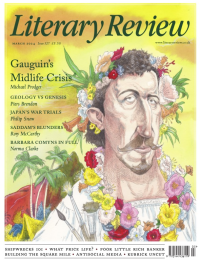Lucy Moore
Escape to Mecca
Vagabond Princess: The Great Adventures of Gulbadan
By Ruby Lal
Yale University Press 240pp £22
In 1576, Emperor Akbar’s 52-year-old aunt Gulbadan Begum led a group of royal Mughal ladies from Agra to Mecca, three thousand miles away. It was the only time in the Mughal era that women made an expedition like this. Their journey was eventful, from an unexpected year-long pause in Surat as they waited for travel passes from the Portuguese traders who patrolled the Arabian Sea to surviving a shipwreck off Aden on their way home. They would not return to Hindustan for seven years, more than three of which they spent in Mecca, where Gulbadan performed the hajj four times and gave generously to the poor. In Vagabond Princess, Ruby Lal tells the full story of the intrepid Gulbadan’s life for the first time.
Born in Kabul in 1523, Gulbadan lived during a period of seismic change for the Mughal dynasty. Her father, Babur (1483–1530), was peripatetic. A descendant of both Genghis Khan and Timur (also known as Tamerlane), he expanded his lands from Uzbekistan, where he was born, through Afghanistan, capturing Kabul in 1504, to the plains of Hindustan, where in the 1520s he created a capital for his expanding empire at Agra. Humayun, his son and Gulbadan’s brother, succeeded his father in 1530, lost everything in 1540 and regained it all in 1555, just before he died. He bequeathed his lands to his son Akbar, whose long reign established Mughal power in the Indian subcontinent.
Life under Babur, a nomadic leader, took place largely in tents and gardens; his grandson Akbar, the consolidator, built the rose-pink sandstone city of Fatehpur Sikri, which combined Timurid, Muslim and Hindu architectural forms and had separate women’s quarters. Gulbadan, born into a world where women had some agency, died at a time when women of her status, while still sometimes powerful, were no longer permitted to raise the purdah, or curtain, that concealed them from the outside world. Her adventure to Mecca would have been inconceivable a generation later.
These early Mughal courts were notable not only for their riches but also for their culture – poetry, songs, calligraphy, illuminated manuscripts, philosophy and history – in which the women of the harem participated. In 1587, Akbar asked Gulbadan, then sixty-three and noted for her learning and piety, to record

Sign Up to our newsletter
Receive free articles, highlights from the archive, news, details of prizes, and much more.@Lit_Review
Follow Literary Review on Twitter
Twitter Feed
Though Jean-Michel Basquiat was a sensation in his lifetime, it was thirty years after his death that one of his pieces fetched a record price of $110.5 million.
Stephen Smith explores the artist's starry afterlife.
Stephen Smith - Paint Fast, Die Young
Stephen Smith: Paint Fast, Die Young - Jean-Michel Basquiat: The Making of an Icon by Doug Woodham
literaryreview.co.uk
15th-century news transmission was a slow business, reliant on horses and ships. As the centuries passed, though, mass newspapers and faster transport sped things up.
John Adamson examines how this evolution changed Europe.
John Adamson - Hold the Front Page
John Adamson: Hold the Front Page - The Great Exchange: Making the News in Early Modern Europe by Joad Raymond Wren
literaryreview.co.uk
"Every page of "Killing the Dead" bursts with fresh insights and deliciously gory details. And, like all the best vampires, it’ll come back to haunt you long after you think you’re done."
✍️My review of John Blair's new book for @Lit_Review
Alexander Lee - Dead Men Walking
Alexander Lee: Dead Men Walking - Killing the Dead: Vampire Epidemics from Mesopotamia to the New World by John Blair
literaryreview.co.uk